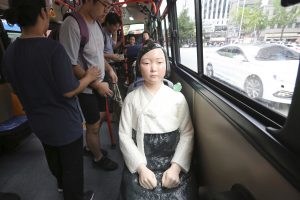Japan’s foreign minister accused South Korea on Monday of worsening already strained ties by making “illegal” demands for compensation for the sexual abuse of Korean women and use of forced laborers during World War II.
Motegi Toshimitsu, in a diplomatic policy speech in parliament, said a recent South Korean court ruling ordering Japan to compensate 12 South Korean women who were sexually abused in Japanese military brothels during the war was “an abnormal development absolutely unthinkable under international law and bilateral relations.”
“We strongly urge South Korea to correct the violation of international law as soon as possible” and restore healthy relations, Motegi said.
The Seoul Central District Court ruled on January 8 that the Japanese government must give 100 million won ($91,360) to each of 12 elderly women who filed lawsuits in 2013 over their wartime suffering as “comfort women.”
They were among tens of thousands of women across Japanese-occupied Asia and the Pacific who were sent to front-line Japanese army brothels.
The ruling worsened tensions between the two countries, whose relations had already plunged to the lowest level in decades over earlier South Korean rulings on Japan’s actions during its 1910-1945 colonial rule of the Korean Peninsula.
South Korea’s Supreme Court in 2018 ordered Japanese companies to provide reparations to some South Koreans who were forced to work in their factories during the war.
The dispute over forced labor escalated into a trade dispute and prompted South Korea to threaten to scrap a 2016 military intelligence-sharing agreement with Japan, a key component of their regional defense cooperation with the United States.
Japan has protested the court rulings, saying all wartime compensation issues were settled under a 1965 treaty normalizing relations with South Korea in which Japan provided $500 million in economic assistance to that country.
In Seoul, South Korean President Moon Jae-in said Monday that it “wouldn’t be desirable for bilateral relations” if Seoul and Tokyo fail to find a diplomatic solution before South Korean courts proceed with liquidating the local assets of the Japanese companies that were seized after they refused to compensate the Korean wartime laborers.
Moon also described the “comfort women” ruling as “honestly a complicating” development for government efforts to improve relations with Japan. Speaking at a news conference, he did not give details of any possible diplomatic efforts.
Motegi called South Korea “an important neighbor” and said its cooperation with Japan and the United States was “indispensable for regional security,” including the response to North Korea’s nuclear and missile programs.
Japan, under a 1995 semi-governmental Asian Women’s Fund, offered payments and apology letters to certified victims of its wartime sexual abuse from five countries, settling disputes with all but South Korea. Sixty-one South Korean victims received 5 million yen ($48,200) each from the 367 million yen ($3.5 million) fund, according to Japan’s foreign ministry, but many others declined to accept the money.
In 2015, the then governments of South Korea and Japan reached what was supposed to be a final and irreversible deal to settle the issue with a new 1 billion yen ($9 million) fund set up by the Japanese government, but the current Moon administration dissolved it, saying the deal was reached without proper consultation with the victims.
In what appeared to be a shift in tone, Moon said Monday that South Korea recognizes the 2015 deal as a legitimate agreement that should provide a foundation for finding a better solution that would satisfy the victims. He did not elaborate.
Japanese Deputy Chief Cabinet Secretary Sakai Manabu said his government “took note” of Moon’s comment. Japan is still calling for appropriate steps by South Korea, while considering all possible options, he said.
“We will be watching what actions will be taken by the South Korean side,” Sakai said.
Reporting by Mari Yamaguchi for the Associated Press from Tokyo, Japan. AP writer Kim Tong-hyung in Seoul, South Korea, contributed to this report.

































